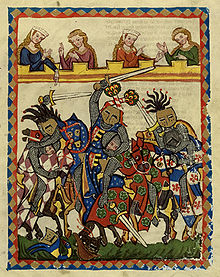- Melee
-
For other uses, see Melee (disambiguation).
 Codex Manesse: a picture of mêlée at a tournament
Codex Manesse: a picture of mêlée at a tournament
Melee (
 /ˈmeɪleɪ/, French: mêlée [mɛle], the French spelling is also quite frequent in English writing), generally refers to disorganized close combat involving a group of fighters. A melee ensues when groups become locked together in combat with no regard to group tactics or fighting as an organized unit; each participant fights as an individual.[1]
/ˈmeɪleɪ/, French: mêlée [mɛle], the French spelling is also quite frequent in English writing), generally refers to disorganized close combat involving a group of fighters. A melee ensues when groups become locked together in combat with no regard to group tactics or fighting as an organized unit; each participant fights as an individual.[1]Contents
Origin of the term
The French term is the feminine past participle of the verb mêler "to mix". Nominalized, it refers to any confused tangle or agitated scramble, in particular unordered combat. The term descends from Old French meslede, from Vulgar Latin misculāta "mixed", from Latin miscēre "to mix"; compare mélange, milieu.
Like other common foreign-derived terms used in English, the word is sometimes written without accents (i.e. as "melee").
Medieval use
During the Middle Ages, tournaments often contained a mêlée consisting of knights fighting one another on foot or while mounted, either divided into two sides or fighting as a free-for-all. The object was to capture opposing knights so that they could be ransomed, and this could be a very profitable business for such skilled knights as William Marshal. There was a tournament ground covering several square miles in northern France to which knights came from all over Europe to prove themselves in quite real combat. This was, in fact, the original form of tournaments and the most popular between the twelfth and thirteenth centuries—jousting being a later development, and one that did not completely displace the mêlée until many more centuries had passed. The original mêlée was engaged with normal weapons and fought with as much danger as a normal battle. Rules slowly tempered the danger, but at all times the mêlée was more dangerous than the joust.
Modern use
The term "melee" has been extended to refer to other forms of combat, such as a naval or armor battle that is fought at abnormally close range with little central control once it starts. The Battle of Trafalgar became a melee when the British ships broke the French and Spanish line, precipitating a ship-to-ship battle. In this instance, the melee was planned; Admiral Nelson used the superior fighting qualities of his crews to offset the greater French and Spanish numbers.
Melee is occasionally used to describe disorganized groups of people and vehicles, such as mobs, mosh pits, and traffic jams.
It is also used in sport. For example, the Australian Football League has an official melee rule which is used to fine players involved in large on-field brawls, regardless of whether or not they throw punches.[citation needed]
Use in gaming
"Melee" has been adopted and popularized as a term in war-gaming, board games, tabletop role-playing games and video games to encompass all close-quarter fighting and directly striking an opponent at ranges generally less than a few feet with, but not only, fists, feet, knives, rifle-butts or any other melee weapon or special spells or tactics with the intention of causing harm.
The term was first applied to games in H.G. Wells's 1913 Little Wars, where the author develops a "melee rule" in his war game. It was later popularized by Dungeons and Dragons, which featured a "melee phase" to represent the fighting of characters outside of bows and magic.
This term still applies to most role-playing games, but is often used in the context of first-person shooter video games to specify a non-ranged attack. This began with the 1992 game, Wolfenstein 3D, which featured a knife that could be selected from the inventory, just like a gun. Because of the risk involved in using a melee weapon, they were typically the most powerful weapons available, in terms of damage. Later, Duke Nukem 3D would include a button that allowed the character to kick enemies while still wielding a gun.
See also
- Close quarters battle
- Duel
- Hand-to-hand combat
- Hastilude
- Knife fight
- List of melee weapons
- Martial arts
- Melee weapon
- Melee Island
- Mixed martial arts
- Swordsmanship
References
External links
Categories:- Tactical formations of the Napoleonic Wars
- Violence
- Warfare of the Middle Ages
- Mêlée weapons
- Military terminology
- French loanwords
Wikimedia Foundation. 2010.
